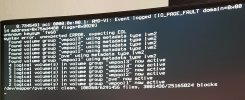root@axiom1:~# ip a
1: lo: <LOOPBACK,UP,LOWER_UP> mtu 65536 qdisc noqueue state UNKNOWN group default qlen 1000
link/loopback 00:00:00:00:00:00 brd 00:00:00:00:00:00
inet 127.0.0.1/8 scope host lo
valid_lft forever preferred_lft forever
inet 10.15.15.18/32 brd 10.15.15.18 scope global lo
valid_lft forever preferred_lft forever
inet6 2001:db8:1111::/128 scope global
valid_lft forever preferred_lft forever
inet6 ::1/128 scope host
valid_lft forever preferred_lft forever
2: enp2s0: <NO-CARRIER,BROADCAST,MULTICAST,UP> mtu 1500 qdisc mq master br0 state DOWN group default qlen 1000
link/ether 00:60:e0:7a:ba:97 brd ff:ff:ff:ff:ff:ff
3: enp3s0: <NO-CARRIER,BROADCAST,MULTICAST,UP> mtu 1500 qdisc mq master br0 state DOWN group default qlen 1000
link/ether 00:60:e0:7a:ba:98 brd ff:ff:ff:ff:ff:ff
4: enp4s0: <BROADCAST,MULTICAST,UP,LOWER_UP> mtu 1500 qdisc mq master vmbr2 state UP group default qlen 1000
link/ether 00:60:e0:7a:ba:99 brd ff:ff:ff:ff:ff:ff
5: enp5s0: <BROADCAST,MULTICAST,UP,LOWER_UP> mtu 1500 qdisc mq master bat0 state UP group default qlen 1000
link/ether 00:60:e0:7a:ba:9a brd ff:ff:ff:ff:ff:ff
inet6 fe80::260:e0ff:fe7a:ba9a/64 scope link
valid_lft forever preferred_lft forever
6: enp6s0: <BROADCAST,MULTICAST,UP,LOWER_UP> mtu 1500 qdisc mq master bat0 state UP group default qlen 1000
link/ether 00:60:e0:7a:ba:9b brd ff:ff:ff:ff:ff:ff
inet6 fe80::260:e0ff:fe7a:ba9b/64 scope link
valid_lft forever preferred_lft forever
7: enp7s0: <NO-CARRIER,BROADCAST,MULTICAST,UP> mtu 1500 qdisc mq state DOWN group default qlen 1000
link/ether 00:60:e0:7a:ba:9c brd ff:ff:ff:ff:ff:ff
8: enp10s0f0: <NO-CARRIER,BROADCAST,MULTICAST,SLAVE,UP> mtu 9000 qdisc mq master bond0 state DOWN group default qlen 1000
link/ether 00:60:e0:7a:ba:93 brd ff:ff:ff:ff:ff:ff
9: enp10s0f1: <NO-CARRIER,BROADCAST,MULTICAST,UP> mtu 9000 qdisc mq state DOWN group default qlen 1000
link/ether 00:60:e0:7a:ba:94 brd ff:ff:ff:ff:ff:ff
10: enp12s0f0: <NO-CARRIER,BROADCAST,MULTICAST,SLAVE,UP> mtu 9000 qdisc mq master bond0 state DOWN group default qlen 1000
link/ether 00:60:e0:7a:ba:93 brd ff:ff:ff:ff:ff:ff permaddr 00:60:e0:7a:ba:95
11: enp12s0f1: <NO-CARRIER,BROADCAST,MULTICAST,UP> mtu 9000 qdisc mq state DOWN group default qlen 1000
link/ether 00:60:e0:7a:ba:96 brd ff:ff:ff:ff:ff:ff
12: br0: <NO-CARRIER,BROADCAST,MULTICAST,UP> mtu 1500 qdisc noqueue state DOWN group default qlen 1000
link/ether 00:60:e0:7a:ba:97 brd ff:ff:ff:ff:ff:ff
13: bat0: <BROADCAST,MULTICAST,UP,LOWER_UP> mtu 1500 qdisc noqueue state UNKNOWN group default qlen 1000
link/ether be:8d:ac:3a:38:a1 brd ff:ff:ff:ff:ff:ff
inet 10.15.10.18/24 scope global bat0
valid_lft forever preferred_lft forever
inet6 fe80::bc8d:acff:fe3a:38a1/64 scope link
valid_lft forever preferred_lft forever
14: enp2s0.0@enp2s0: <NO-CARRIER,BROADCAST,MULTICAST,UP> mtu 1500 qdisc noqueue master vmbr1 state LOWERLAYERDOWN group default qlen 1000
link/ether 00:60:e0:7a:ba:97 brd ff:ff:ff:ff:ff:ff
15: vmbr1: <NO-CARRIER,BROADCAST,MULTICAST,UP> mtu 1500 qdisc noqueue state DOWN group default qlen 1000
link/ether 00:60:e0:7a:ba:97 brd ff:ff:ff:ff:ff:ff
16: vmbr2: <BROADCAST,MULTICAST,UP,LOWER_UP> mtu 1500 qdisc noqueue state UP group default qlen 1000
link/ether 00:60:e0:7a:ba:99 brd ff:ff:ff:ff:ff:ff
inet6 fe80::260:e0ff:fe7a:ba99/64 scope link
valid_lft forever preferred_lft forever
17: bond0: <NO-CARRIER,BROADCAST,MULTICAST,MASTER,UP> mtu 9000 qdisc noqueue master vmbr3 state DOWN group default qlen 1000
link/ether 00:60:e0:7a:ba:93 brd ff:ff:ff:ff:ff:ff
18: vmbr3: <NO-CARRIER,BROADCAST,MULTICAST,UP> mtu 1500 qdisc noqueue state DOWN group default qlen 1000
link/ether 00:60:e0:7a:ba:93 brd ff:ff:ff:ff:ff:ff
inet 192.168.10.18/27 scope global vmbr3
valid_lft forever preferred_lft forever
19: vmbr0: <NO-CARRIER,BROADCAST,MULTICAST,UP> mtu 1500 qdisc noqueue state DOWN group default qlen 1000
link/ether ee:f7:70:f7:2b:d6 brd ff:ff:ff:ff:ff:ff
20: enp7s0.20@enp7s0: <NO-CARRIER,BROADCAST,MULTICAST,UP> mtu 1500 qdisc noqueue master vmbr6 state LOWERLAYERDOWN group default qlen 1000
link/ether 00:60:e0:7a:ba:9c brd ff:ff:ff:ff:ff:ff
21: vmbr6: <NO-CARRIER,BROADCAST,MULTICAST,UP> mtu 1500 qdisc noqueue state DOWN group default qlen 1000
link/ether 00:60:e0:7a:ba:9c brd ff:ff:ff:ff:ff:ff



